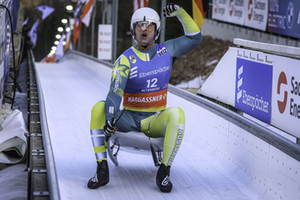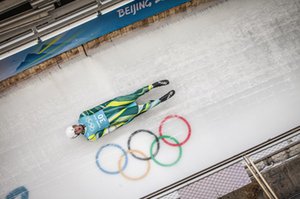Mental Health Month: How Alex Ferlazzo's Mental Work Paid Off During the Pandemic

Berchtesgaden (FIL/15 Oct 2024) In October 2024, the International Olympic Committee (IOC) launched the "Mental Health Month" to highlight the importance of mental health for athletes. During this initiative, a group of Olympians will share their personal experiences and challenges with mental health on IOC platforms. One particularly inspiring story comes from Alex Ferlazzo, a three-time Olympian in luge from Australia.
For Ferlazzo, whose sport demands extreme precision and mental resilience, the pandemic became a turning point. While many athletes struggled with the uncertainties and pressures of lockdowns, Ferlazzo found a new connection to himself and developed a mental strength that has had a lasting impact on his athletic career.
Read on to discover how Covid put Alex Ferlazzo on the "right track" and what he has taken away from this challenging time.
Why Covid put Alex Ferlazzo in the ‘right direction’
You can expect being an Australian winter Olympian certainly brings its challenges, none least than for Alex Ferlazzo.
Hailing from Townsville City, Queensland, the 29-year-old normally spends up to six to seven months out of the country to train in far off places where winters get well below 20 °C, the average winter temperature in Townsville.
You’d think a global pandemic, where borders are indefinitely closed, flights cancelled, curfews in place, would be the ultimate disaster for someone that travels for a living.
For Ferlazzo though, this could be further from the truth.
“That was probably the most important part of my recent career,” said Ferlazzo who is only the fourth ever Australian luger to compete internationally following Roger White, Karen Flynn and Hannah Campbell-Pegg. “After my second Olympics in Korea, I was unsure if I was going to continue the sport.
“Things weren't really going how I wanted. I wasn't happy with the team environment I was in. I was with the Latvians at the time.”

“I love those guys, but the language barrier wasn't really working out and I wasn't ready to be on the circuit without English speaking folk to begin with.”
Ferlazzo’s disappointing 28th place finish in PyeongChang 2018, failing to advance to the fourth and final run, ignited a period of reflection for the Australian.
It ended up turning into a six-month sabbatical from luge, as he sought to work out whether or not to continue the sport, whether the huge effort he was putting into travelling and training were worth the results.
“I came to the conclusion, ‘OK, we're going to continue, but I'm going to do properly this time, put everything, throw everything into it,’” explained Ferlazzo on why he decided to continue.
“Things started to come together leading up. I joined the American team, so I had the English-speaking coaching staff and athletes.
“I had a new sled builder, Duncan Kennedy, and he helped me out with a lot of things as well.”
But despite fixing the language issue and beginning to work with renowned sled builder and former three-time Olympian Kennedy, Ferlazzo felt was still missing something.
He believed ‘nerves’ in competition were still holding him back from fulfilling his potential. It turned out the pandemic was the solution.
“It gave me a whole year off sliding and forced me to stay in Australia and figure that out,” he said. “I had a lot of time to evaluate my thought process before races and after races, get my mental game in the right place and actually have a plan mentally for the season.
“Training runs, competitions, travelling overseas for six months of the year, away from friends and family, everything revolving around being an Australian athlete, and competing at the highest level of the most random sport, especially where I'm from in North Queensland.

“Covid really put me in the right direction with that,” he added.
After a decade of constantly training and competing overseas, clocking up thousands of miles of travelling, the Covid-19 pandemic turned out to be Ferlazzo’s unlikely blessing in disguise.
Being locked away also gave the America-Pacific 2024 bronze medallist the valuable time he previously never had to visualise the tracks, watch FIL races from afar, making sure to keep luge fresh in his mind.
Ferlazzo hadn’t competed for 18 months but on his long-awaited return to the track, the second World Cup of the 2021/22 season in Sochi, Ferlazzo came 18th in the men’s sprint singles, a result he couldn’t believe.
“I think just the mental work I'd done had proven itself in that first run,” he said on the reasons behind his impressive time of 52.929. “I was sliding good if not better than what I was before Covid, from getting my mental game in the right place, visualising and training each track to the best I could at home in Australia.
“I think another major part of that was I had time to forget my bad habits in sliding,” he added. I got to rebuild the good ones and not just like things I do down the track, but also like negative thoughts that all athletes have coming into their minds before and during races.”
A surprisingly successful return bled into Beijing 2022 which turned out to be Ferlazzo and Australia’s best luge result at an Olympic Games, 16th place with a combined time of 3:53.219.
Competitions though in the 2021/22 season including the Olympics remained under extremely tight restrictions. It meant Ferlazzo was out of Australia for eight months, without seeing any family in that time and camaraderie between fellow lugers held back.
It was this isolation however, that gave Ferlazzo the edge.

“I felt like I handled that better than a lot of other athletes on the circuit,” he said when asked about coping with the extended time away from home. “I think that really gave myself an advantage. Not being angry about what had happened from Covid and how it changed a lot of lives but how I made the best of that scenario.
“It paid off leading into the Olympics.”
The trajectory for Ferlazzo since Beijing hasn’t stopped. He came fifth in the 2024 World Championships earlier this year in Altenberg in what he called the “most difficult track” in Germany.
He has trained with Latvia, USA and Germany and this season is to be with Canada, the home nation for the upcoming 2025 World Championships in Whistler under coach Robert Fegg, who he was also with when training alongside USA.
Since deciding to double down his commitment to the sport in 2019, Ferlazzo has never looked back with year-on-year consistent improvement since Pyeongchang.
But this upcoming season is the dress rehearsal for what all lugers on the circuit are aspiring for. Ferlazzo calls it the “practise season” for Milano-Cortina, he must now make sure the momentum doesn’t stop.
For more information on the full range of mental health support available to athletes, visit the Athlete365 #MentallyFit section.








